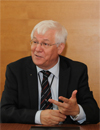 |
||
|
Japan Temporarily Halts Radioactive Water Cleaning System at Fukushima RIA Novosti, PUBLISHED 21.05.2014 Tokyo Electric Power Co. (TEPCO), the operator of the crippled Fukushima Daiichi nuclear power plant in northeastern Japan announced it had temporarily suspended all the three lines of the Advanced Liquid Processing System (ALPS), the NHK channel reported Tuesday. According to NHK, the operator was forced to halt the work of the system after it revealed a failure of radioactive water cleaning process. TEPCO has not yet released an official confirmation. 300 tons of water with strontium levels equaling 80 million becquerels per liter leaked from a storage reservoir into the Pacific Ocean. The leak was then classified as a level three incident on the International Nuclear Event Scale (INES). Topics: NPP Fukushima Daiichi Other news: Hungary Enacts Law to Expand Nuclear Power With Russian Aid Hungary’s president has signed a bill into law to expand a nuclear power plant in the country with Russian assistance. Hungary Lawmakers OK Russia Nuclear Plant Deal Russia will provide Hungary a loan of up to 10 billion euros ($13.5 billion) - around 80 percent of construction costs. Russia to Lend Hungary $13.7Bln for Nuclear Plant The deal was announced during a state visit to Moscow by Hungarian Prime Minister Viktor Orban and was hailed by Russian President Vladimir Putin. |
Hero of the day 
We are currently working with the Nuclear Decommissioning Authority (NDA) on this approach, which was submitted in response to their February 2012 call for alternative proposals. We appreciate that the UK is in the early stages of their policy development activities and are pleased to be involved in such important work. INTERVIEW
Yanko Yanev OPINION
Joint Plan of Action |

